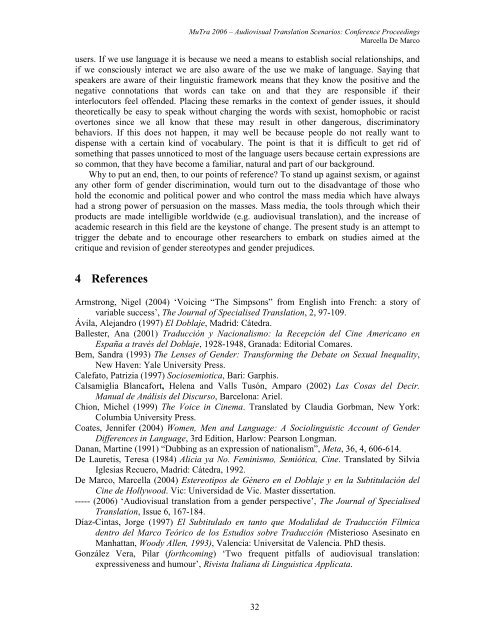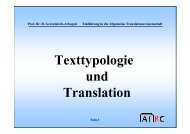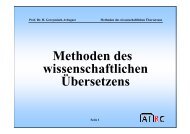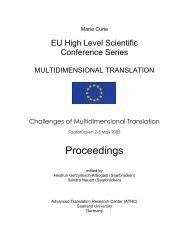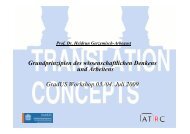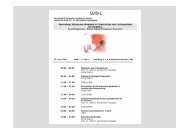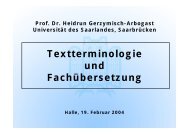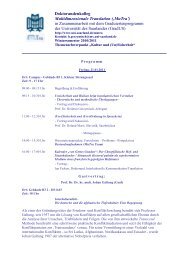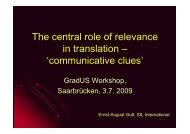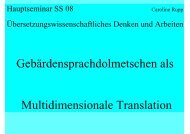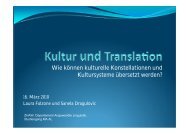Proceedings - Translation Concepts
Proceedings - Translation Concepts
Proceedings - Translation Concepts
You also want an ePaper? Increase the reach of your titles
YUMPU automatically turns print PDFs into web optimized ePapers that Google loves.
MuTra 2006 – Audiovisual <strong>Translation</strong> Scenarios: Conference <strong>Proceedings</strong><br />
Marcella De Marco<br />
users. If we use language it is because we need a means to establish social relationships, and<br />
if we consciously interact we are also aware of the use we make of language. Saying that<br />
speakers are aware of their linguistic framework means that they know the positive and the<br />
negative connotations that words can take on and that they are responsible if their<br />
interlocutors feel offended. Placing these remarks in the context of gender issues, it should<br />
theoretically be easy to speak without charging the words with sexist, homophobic or racist<br />
overtones since we all know that these may result in other dangerous, discriminatory<br />
behaviors. If this does not happen, it may well be because people do not really want to<br />
dispense with a certain kind of vocabulary. The point is that it is difficult to get rid of<br />
something that passes unnoticed to most of the language users because certain expressions are<br />
so common, that they have become a familiar, natural and part of our background.<br />
Why to put an end, then, to our points of reference? To stand up against sexism, or against<br />
any other form of gender discrimination, would turn out to the disadvantage of those who<br />
hold the economic and political power and who control the mass media which have always<br />
had a strong power of persuasion on the masses. Mass media, the tools through which their<br />
products are made intelligible worldwide (e.g. audiovisual translation), and the increase of<br />
academic research in this field are the keystone of change. The present study is an attempt to<br />
trigger the debate and to encourage other researchers to embark on studies aimed at the<br />
critique and revision of gender stereotypes and gender prejudices.<br />
4 References<br />
Armstrong, Nigel (2004) ‘Voicing “The Simpsons” from English into French: a story of<br />
variable success’, The Journal of Specialised <strong>Translation</strong>, 2, 97-109.<br />
Ávila, Alejandro (1997) El Doblaje, Madrid: Cátedra.<br />
Ballester, Ana (2001) Traducción y Nacionalismo: la Recepción del Cine Americano en<br />
España a través del Doblaje, 1928-1948, Granada: Editorial Comares.<br />
Bem, Sandra (1993) The Lenses of Gender: Transforming the Debate on Sexual Inequality,<br />
New Haven: Yale University Press.<br />
Calefato, Patrizia (1997) Sociosemiotica, Bari: Garphis.<br />
Calsamiglia Blancafort, Helena and Valls Tusón, Amparo (2002) Las Cosas del Decir.<br />
Manual de Análisis del Discurso, Barcelona: Ariel.<br />
Chion, Michel (1999) The Voice in Cinema. Translated by Claudia Gorbman, New York:<br />
Columbia University Press.<br />
Coates, Jennifer (2004) Women, Men and Language: A Sociolinguistic Account of Gender<br />
Differences in Language, 3rd Edition, Harlow: Pearson Longman.<br />
Danan, Martine (1991) “Dubbing as an expression of nationalism”, Meta, 36, 4, 606-614.<br />
De Lauretis, Teresa (1984) Alicia ya No. Feminismo, Semiótica, Cine. Translated by Silvia<br />
Iglesias Recuero, Madrid: Cátedra, 1992.<br />
De Marco, Marcella (2004) Estereotipos de Género en el Doblaje y en la Subtitulación del<br />
Cine de Hollywood. Vic: Universidad de Vic. Master dissertation.<br />
----- (2006) ‘Audiovisual translation from a gender perspective’, The Journal of Specialised<br />
<strong>Translation</strong>, Issue 6, 167-184.<br />
Díaz-Cintas, Jorge (1997) El Subtitulado en tanto que Modalidad de Traducción Fílmica<br />
dentro del Marco Teórico de los Estudios sobre Traducción (Misterioso Asesinato en<br />
Manhattan, Woody Allen, 1993), Valencia: Universitat de Valencia. PhD thesis.<br />
González Vera, Pilar (forthcoming) ‘Two frequent pitfalls of audiovisual translation:<br />
expressiveness and humour’, Rivista Italiana di Linguistica Applicata.<br />
32


